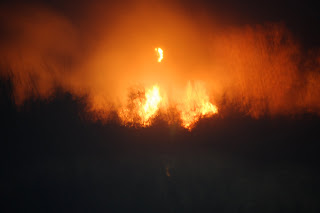
Dis Ting I do....
Dis Ting (meaning “this thing”) is a term they use in Ghana when they can’t remember a phrase or term in English. Or, when they don’t want to take the time to explain what exactly they are talking about, they will say, “dis ting”. To give you an example, a farmer might be talking to me about harvesting cashews and describing the collection of nuts. “I pick the nuts off the ground, separate the nut from the ground and then carry them to dis ting.” Dis ting in this context means that he will place the nuts inthe huge bowls, carry them back to his house where he will dry them for three days and then try to sell them to market. I am supposed to get all that by him saying, “dis ting”, somehow.
The purpose of this particular blog is not to educate you on Ghanaian phrases (although that would be a pretty fun blog to write), but to update you on what has been a very, very long hiatus, in which I want to apologize. My service here in Ghana as a US Peace Corps volunteer has come to an end. By His grace, I am now back in the US and wanted to pause and give thought to my service. So much has happened to me while I was in Ghana, the experiences, challenges, accomplishments, sicknesses, loneliness, hardships; laughter and tears; all these things has changed who I am. For me todescribe it to you would be like asking someone who drinks PBR’s to describe the complexities and tastes of a 20 year old bottle Shiraz. (No offense Chris) So, being a guy who enjoys a cold PBR as well as a nice glass of wine (although I have forgotten what that is) I will attempt to put into words dis ting I do.
In previous blogs I have tried to describe to you what it is like to live in a country so different from my own. The transportation, food, culture and climate has allowed me to have a better appreciation for what I took for granted in the US. I’ve learned to accept the differences in culture, and that just because people in other cultures may do things differently doesn’t mean that it’s bad or not as good as how we do things in the US. I have learned that just because you don’t have money (or food, house or clothing for that matter) doesn’t mean you can’t be happy. I’ve seen 5 and 6 year old boys who live on the streets of Accra, who get food by begging, dressed in filthy rags and sleep on sidewalks. But as I watch them, they laugh and play like someone who doesn’t have a care in the world. I have a new respect for Muslims who take their faith so seriously. The honesty, respect and love that I have felt from them has been overwhelming. On the other hand, I have had devout “Christian” acquaintances lie, cheat and steal from me. This is a harsh culture, where some people in leadership have gotten there by bribery, manipulation and taking advantage of the poor. I have seen the poor, sick and truly needy give their food and money to those in need. It’s a culture of contradiction, where hope and despair are as intertwined as a weave in a sweater.
I hope that somehow in my blog entries I have been able to give you a snap shot of this country. I am not one who likes to focus on the negative and have tried to write about the good things. For every 10 people that are taking advantage of things, there is one who genuine and pure at heart. For those, I have stayed and hope that in some small way I have been able to encourage, train and give resources to help them in their journey of life.
I believe that I was called to Ghana to do this work. I have tried to be obedient to the calling, serving in any capacity that I could. During the last few months, I was very busy finishing projects and passing the torch to others. Unfortunately, I had to leave about 5 weeks earlier than expected and did was not able to say the proper goodbyes that I wanted to do. Driving away from Wenchi left me with mixed emotions. Would I ever see these people again? Did my time/work really make any difference? Those are hard questions to answer and on a large grandiose level, I might be inclined to think I didn’t make much of an impact. However, if you look at the individuals that crossed my path, then yes I did make some differences. The relationships that I developed with many other Peace Corps Volunteers are friendships that will last a lifetime. What we have learned from each other, and the experiences we have shared has helped define who I am, and I hope the same with them. The times I spent with Emmanuella, the 10 year old living with me, helping her with her homework; or spending many nights playing board games with Attaa and chatting about life; or talking with Yahya and Sualihu about cashew stuff; those times we both learned something from each other and walked away a better of a person.
Now I can look back and say yes, this time in Ghana not only helped other individuals but me as well. But I discovered something e
 lse as well. You don’t have to travel 4,000 miles to make a difference in someone’s life. You can do it right where you are now. You have a circle of family, friends and acquaintances. And guess what? They are watching you! They are watch how you react to life’s pressures. They are seeing how you will respond to someone that treats your unfairly. As they watch they learn. You are making an impact on people right now; good or bad. So my advice to you is to act honorably, live a life with no regrets, laugh often and love more.
lse as well. You don’t have to travel 4,000 miles to make a difference in someone’s life. You can do it right where you are now. You have a circle of family, friends and acquaintances. And guess what? They are watching you! They are watch how you react to life’s pressures. They are seeing how you will respond to someone that treats your unfairly. As they watch they learn. You are making an impact on people right now; good or bad. So my advice to you is to act honorably, live a life with no regrets, laugh often and love more.So now it is time to move on to a new chapter in Wayne’s World. I want to thank you all for reading these silly blogs, and for the kind words of encouragement and support. The next stop? Well, I am leaving on Monday for a month in Columbia, South America to take part in my brothers wedding. (THAT should be a good blog!) Then in September I will go back to Africa. I just accepted a job as the Director of Operations for Africa for a company that sells, you guessed it, cashews! So who knows, maybe this blog thing will continue.
In the meantime, live life to the fullest and.....
Go Nuts!
“Just look out around us people fighting their wars. They think they’ll be happy when they settle the scores. Let’s lay down our weapons that hold us apart and be still for just a minute try to open our hearts more love..... If there is ever an answer it’s more love......” Dixie Chicks



